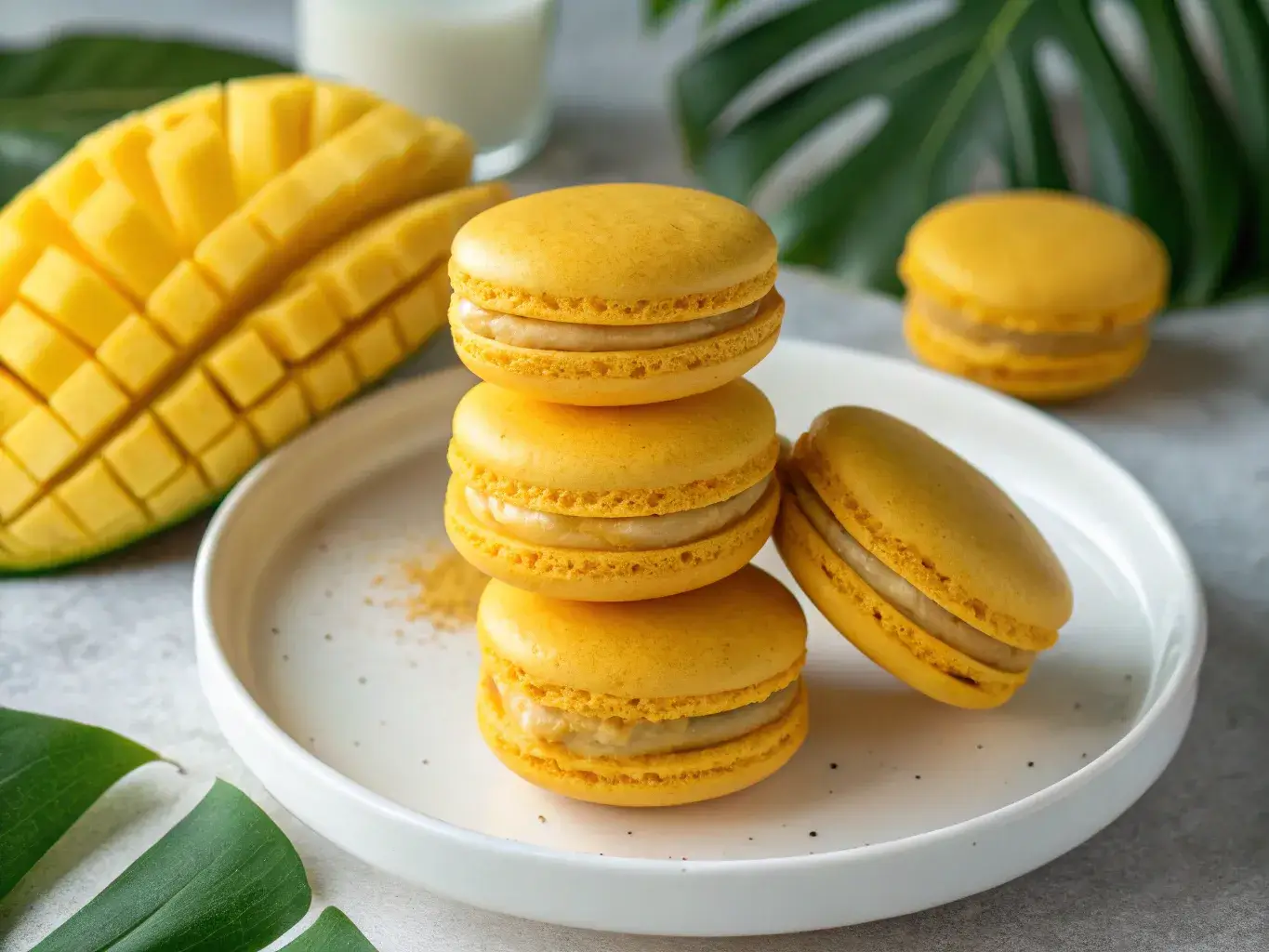Mango macarons are a sunshine-filled spin on the traditional French cookie, bright, fruity, and naturally gluten-free. Here at Recipes of Kitchen, I’m always creating desserts that balance elegance with allergen-friendly ingredients, and these tropical gems are no exception.
Whether you’re new to baking or just craving something fresh and bold, mango macarons are a must-try in any gluten-free kitchen.
Why Mango Macarons Are Worth the Effort
The Flavor That Sets Mango Macarons Apart
Unlike the usual vanilla or chocolate varieties, mango macarons bring a tropical punch that’s both refreshing and elegant. The smooth almond shell complements the sweet, tangy mango filling, making every bite burst with sunshine.
What makes mango macarons special is their unique balance of richness and fruitiness. You get the familiar chew of a classic macaron, but with a bright, exotic twist. This flavor combo works perfectly for summer gatherings, gift boxes, or anytime you want to elevate your dessert table.
Print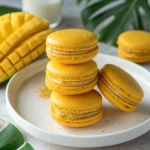
Mango Macarons: A Gluten-Free Tropical Treat
- Total Time: 1 hour
- Yield: 24 macarons 1x
Description
Tropical-inspired mango macarons with crisp almond shells and a smooth, dairy-free mango jam filling. Bright, fruity, and naturally gluten-free.
Ingredients
3/4 cup almond flour
1 cup powdered sugar
2 large egg whites, room temperature
1/4 cup granulated sugar
1/4 tsp cream of tartar (optional)
1/2 tsp mango extract or flavoring
Orange or yellow gel food coloring (optional)
1/3 cup mango jam or mango puree (dairy-free)
Instructions
1. Line two baking sheets with parchment paper or silicone mats.
2. Sift together almond flour and powdered sugar, discarding any large pieces.
3. In a grease-free mixing bowl, beat egg whites until foamy. Add cream of tartar if using.
4. Slowly add granulated sugar while whipping until stiff peaks form.
5. Mix in mango extract and gel food coloring if desired.
6. Fold the dry ingredients into the meringue in batches until the batter flows in thick ribbons (macaronage stage).
7. Transfer to a piping bag fitted with a round tip and pipe evenly sized circles onto the prepared baking sheets.
8. Tap the trays firmly to remove air bubbles. Pop any remaining with a toothpick.
9. Let macarons rest at room temperature for 30–60 minutes until a skin forms.
10. Preheat oven to 300°F (150°C). Bake one tray at a time for 14–16 minutes.
11. Cool completely before removing from the baking surface.
12. Match up similar-sized shells and fill with mango jam or puree. Press gently to sandwich.
13. Refrigerate filled macarons for 24 hours to allow flavors to meld.
Notes
Use thick mango jam or cooked mango puree to avoid runny filling.
Avoid using fresh mango juice in the shell batter—use extract for flavor and stability.
Macaron shells are naturally dairy-free; make sure the jam contains no added dairy.
Mango macarons pair well with coconut or passion fruit flavors for future variations.
- Prep Time: 45 minutes
- Cook Time: 15 minutes
- Category: Dessert
- Method: Baking
- Cuisine: French
Nutrition
- Serving Size: 1 macaron
- Calories: 95
- Sugar: 11g
- Sodium: 5mg
- Fat: 3.5g
- Saturated Fat: 0.3g
- Unsaturated Fat: 3g
- Trans Fat: 0g
- Carbohydrates: 13g
- Fiber: 1g
- Protein: 2g
- Cholesterol: 0mg
Keywords: mango macarons, dairy-free macarons, tropical macarons, French dessert
Why Mango Works So Well in Macarons
Mango is a surprisingly macaron-friendly fruit. Its smooth texture and natural sweetness make it ideal for curds, buttercreams, or jams without overwhelming the delicate shell.
| Why Mango Works | Benefit for Macarons |
|---|---|
| Low acidity | Won’t break the filling or shell |
| Thick consistency | Easy to control when piping |
| Sweet + fruity balance | Enhances flavor without added sugar |
| Vibrant color | Makes mango macarons visually stunning |
If you’re looking for a gluten-free macaron that feels bright and modern, mango macarons are the perfect recipe to master.
Want to try another bold flavor pairing? Explore our Vanilla Pudding Frosting to create a creamy twist for your next batch.
How to Make Mango Macarons
Step-by-Step Instructions for Perfect Mango Macarons
Making mango macarons might sound intimidating, but with a little practice and precision, you can absolutely master them even in a gluten-free kitchen. The key is to focus on technique and balance, especially with the fruit filling.
Ingredients You’ll Need
For the Shells:
- Almond flour (superfine)
- Powdered sugar
- Granulated sugar
- Egg whites (room temp)
- Cream of tartar (optional for stability)
- Yellow food coloring (optional)
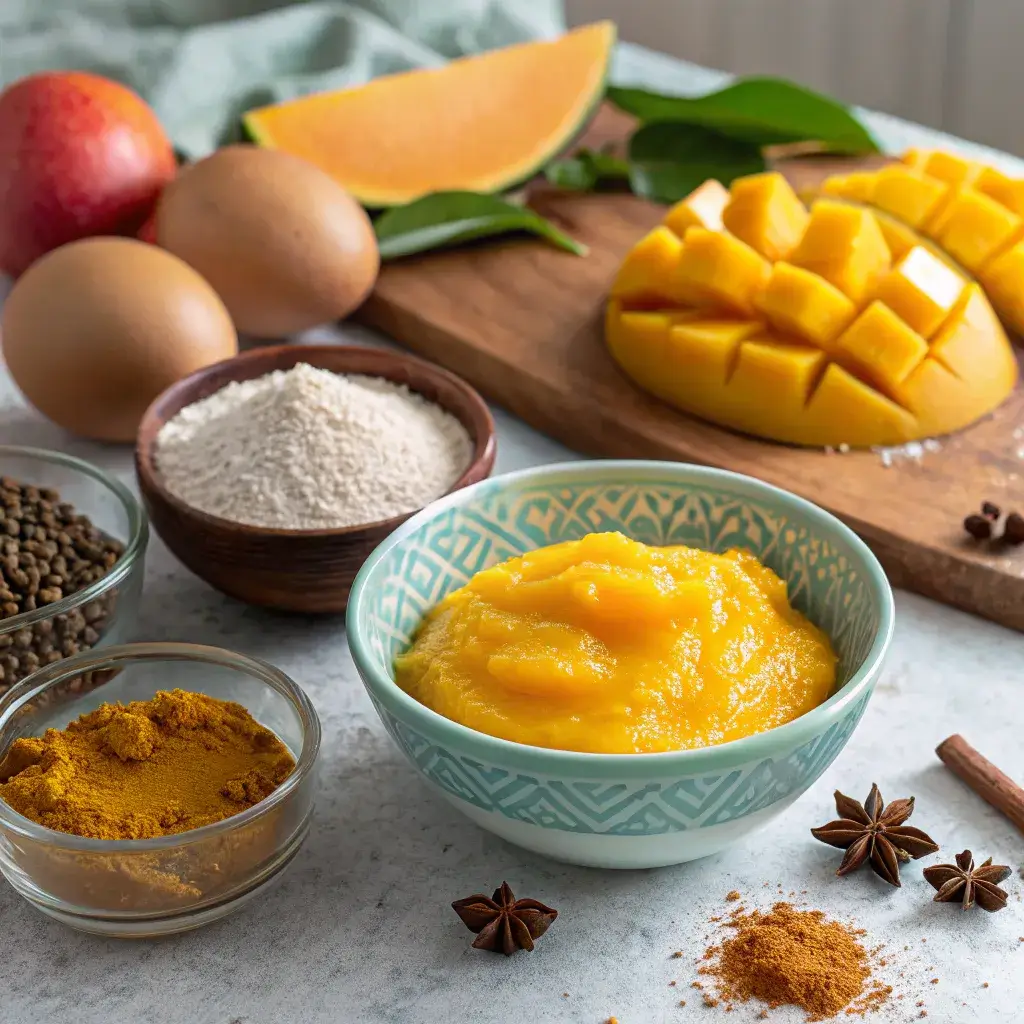
For the Mango Filling:
- Mango purée (fresh or frozen)
- Unsalted or vegan butter
- Powdered sugar
- Lemon juice (to balance sweetness)
Basic Process for Mango Macarons
- Sift dry ingredients: Almond flour and powdered sugar must be lump-free.
- Whip the meringue: Beat egg whites and granulated sugar until stiff peaks form.
- Fold gently (macaronage): Combine dry mix with meringue until batter flows like lava.
- Pipe and rest: Use a piping bag to make even circles. Rest 30 minutes until tops are no longer sticky.
- Bake: At 300°F (150°C) for 14–16 minutes.
- Cool and fill: Once shells cool, pipe in your mango buttercream or jam.
These steps create that classic chewy shell with a light crunch, perfect for showcasing vibrant mango flavor.
Looking for a fun twist? Use the same method with our Eggless Banana Chocolate Chip Muffins batter to create macaron-inspired whoopie pies.
Why Are Macarons So Difficult to Make?
The Challenge Behind Mango Macarons (and All Macarons)
If you’ve ever tried making mango macarons and ended up with cracked shells, no feet, or hollow centers, you’re not alone. Macarons are famously picky pastries. Even expert bakers occasionally face a flop.
But why are mango macarons so tricky?
Macarons depend on a perfect balance between air, moisture, and timing. Add too much mango purée to the filling or overwhip the egg whites, and you might get inconsistent results. Each step of the process, from whipping to folding to resting, affects how well your macarons rise and hold.
Top Mistakes to Avoid
| Mistake | How It Affects Mango Macarons |
|---|---|
| Undermixed batter | Lumpy shells or uneven rise |
| Overmixed batter | Flat shells with no feet |
| Skipped resting time | Cracked tops due to trapped air |
| Too much humidity | Sticky shells or collapsed centers |
| Overfilled with wet purée | Shells may soften or slide apart |
It’s not that mango macarons are impossible, it’s just that they demand patience and attention to detail. Once you learn the rhythm, though, your results become more consistent (and more delicious) every time.
Want to troubleshoot dairy or filling issues? Check out Do Macarons Have Dairy? for helpful insights.
Can I Make Substitutions to the Macarons?
Smart Swaps for Mango Macarons
Yes, you can substitute a few ingredients in mango macarons especially if you’re baking gluten-free, dairy-free, or vegan. But be careful: macarons are sensitive to change, and not all swaps behave the same.
| Original Ingredient | Suggested Substitute | Why It Works |
|---|---|---|
| Almond flour | Sunflower seed flour | Nut-free alternative with similar texture |
| Egg whites | Aquafaba (chickpea water) | Creates a stable vegan meringue |
| Butter in filling | Vegan butter or coconut oil | Keeps mango macarons dairy-free |
| Mango purée | Mango powder + liquid | Offers stronger flavor with less moisture |
Stick with tried-and-true ratios. Too much liquid or sugar in any substitution can lead to cracked shells or soggy centers.
What You Should Never Swap
Avoid changing:
- Powdered sugar (essential for smooth shells)
- Macaronage technique (don’t skip or rush it)
- Resting time before baking (a must for structure)
When done correctly, these small ingredient swaps let you enjoy mango macarons that fit your diet, without compromising on flavor or texture.
Why Are My Macarons Cracked, Hollow, or Have No Feet?
Troubleshooting Common Macaron Problems
If your mango macarons turned out flat, hollow, or cracked, don’t worry. These issues are common, and most are fixable once you understand what went wrong.
| Problem | Possible Cause |
|---|---|
| Cracked shells | Skipped resting or oven too hot |
| Hollow shells | Overwhipped egg whites or underbaked shells |
| No feet | Batter overmixed or tray banged too hard |
| Sticky bottoms | Underbaked or no parchment/silicone mat used |
| Shells stuck together | Excess humidity or soft filling |
Mango macarons are especially sensitive because mango adds moisture to the recipe. If using fresh purée, reduce it slightly or cook it down before mixing.
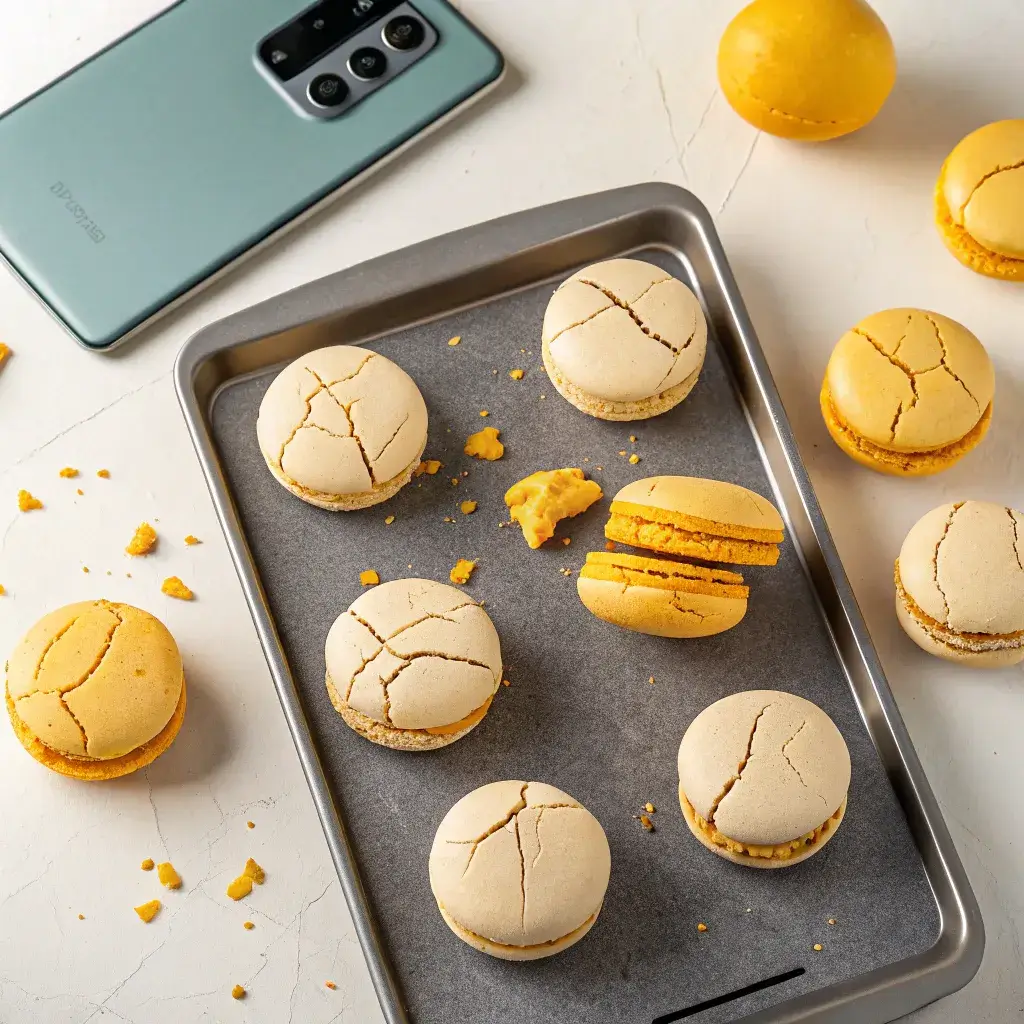
How to Fix It Next Time
- Always rest your piped shells at least 30 minutes
- Use an oven thermometer (home ovens often lie)
- Stick to room-temp egg whites
- Test one macaron first to check your bake time
Patience and consistency will improve your macaron game. Even failed mango macarons still taste good!
How to Make Mango-Flavored Macarons Stand Out
Flavor Boosting Without Ruining Structure
The secret to rich, balanced mango macarons is getting enough flavor without compromising texture. Fresh mango purée can be tricky; too much liquid flattens the shells.
Instead, boost flavor by:
- Adding mango extract or mango powder to the shell batter
- Infusing the filling with reduced mango purée
- Mixing mango with passionfruit or lemon to brighten flavor
Creative Mango Filling Ideas
Here are 3 variations that pair beautifully with the shells:
| Filling | Flavor Profile |
|---|---|
| Mango buttercream | Creamy and rich |
| Mango + lemon curd | Tart and tropical |
| Coconut-mango ganache | Exotic and smooth (dairy-free option) |
These tropical variations turn your mango macarons into bakery-level treats that surprise and delight with every bite.
Need more flavor inspiration? Our Dark Chocolate Granola pairs beautifully with mango desserts for contrast.
How to Pipe, Fill, and Assemble Mango Macarons
Mastering the Macaron Assembly Process
Piping and assembling mango macarons is just as important as baking them. To create perfect, bakery-style sandwiches:
- Use a round tip piping bag
- Pipe straight down at 90° onto parchment or silicone mat
- Let shells rest for at least 30 minutes until dry to the touch
- Bake one tray at a time for consistent heat
Filling with the Perfect Mango Center
Once your shells are cooled, match them by size and fill the flat side of one shell with:
- Mango buttercream
- Mango curd
- Or a dairy-free coconut-mango filling
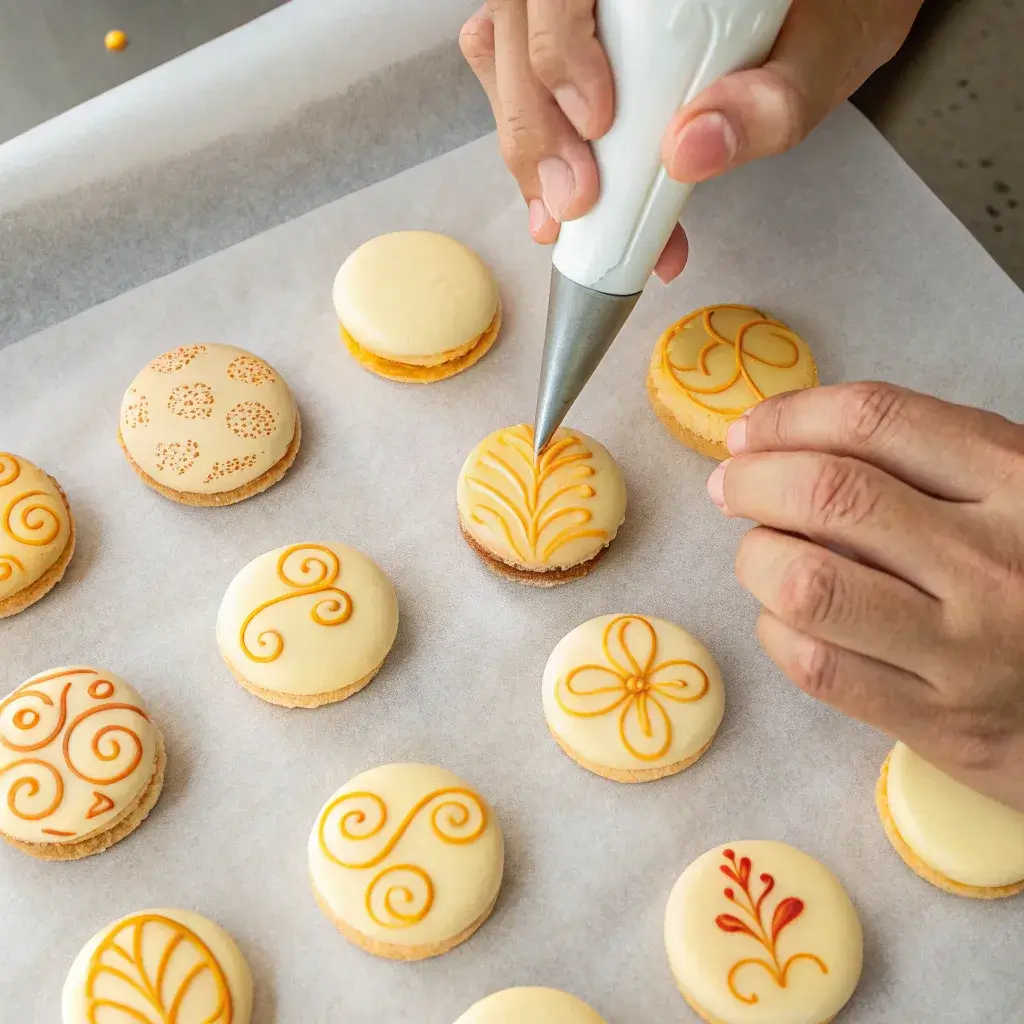
Press gently with a second shell to create the classic sandwich. Chill your mango macarons for 24 hours before serving this step lets the filling soak into the shell for ideal texture.
How to Store Mango Macarons Properly
Keep Your Macarons Fresh and Flavorful
Storing mango macarons correctly ensures they stay crisp outside and chewy inside.
| Storage Method | Time | Tips |
|---|---|---|
| Room temperature | 1–2 days | Use airtight container, avoid humidity |
| Refrigerator | 4–5 days | Best for matured flavor |
| Freezer (unfilled) | 1 month | Freeze flat, layer parchment between |
| Freezer (filled) | 2 weeks | Wrap individually or use macaron box |
Always bring mango macarons to room temperature before serving for best flavor and mouthfeel.
Need more inspiration? Check the Purple Power: 7 Benefits of Purple Potatoes.
Mango Macarons Are More Than a Trend
A Fresh, Fruity Twist on a Classic Treat
Mango macarons combine French tradition with tropical flair. They’re bright, colorful, gluten-free, and fully customizable with vegan or dairy-free options.
Whether you’re a beginner or a seasoned baker, mango is a fun and flavorful way to level up your macaron game.
Craving more tropical flavors? Check out our Lemon and Raspberry Macarons for another fruity favorite.
FAQs About Mango Macarons
Why are macarons notoriously hard to make?
Macarons are sensitive to moisture, meringue stability, and temperature. A small mistake like overmixing or skipping rest can affect rise, feet, or shape.
How to make mango macarons?
Make almond shells using egg whites, almond flour, and sugar. Fill them with mango buttercream, curd, or jam. Let rest and refrigerate overnight for the best result.
Can I make substitutions to the macarons?
Yes! Use vegan butter, aquafaba, or nut-free flours if needed. Just avoid swapping powdered sugar or skipping the rest period.
Why are my macarons cracked, hollow, or footless?
Common reasons include overmixed batter, underbaked shells, or too much liquid in the filling. Resting shells and using an oven thermometer help.
How to make mango-flavored macarons?
Use mango purée, extract, or powder in the filling. Add a small amount to the shells if flavoring them directly, but keep the moisture low.

